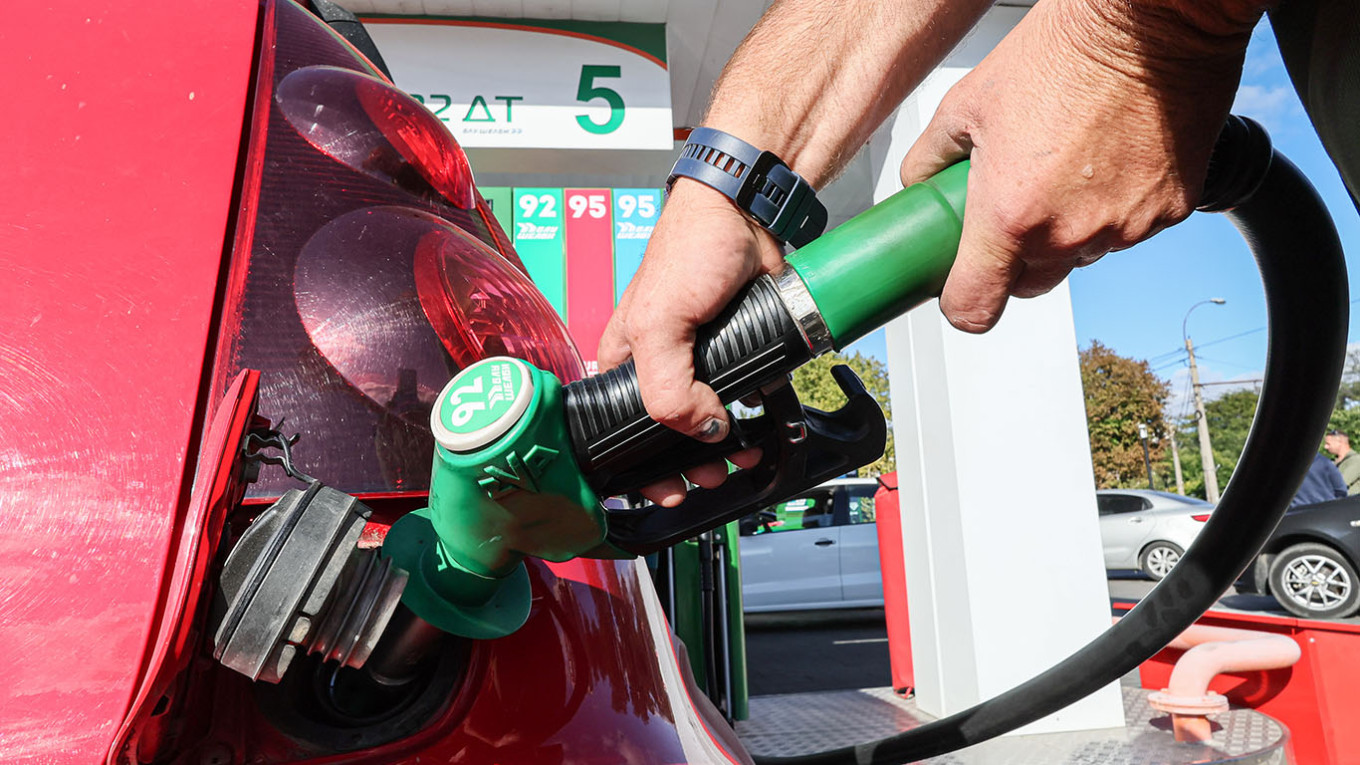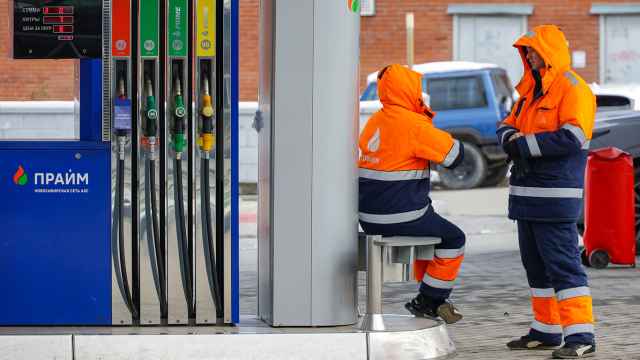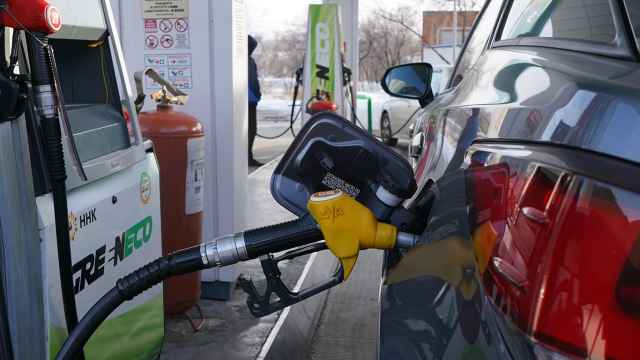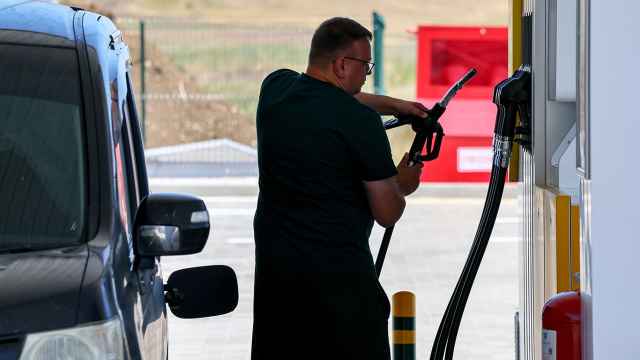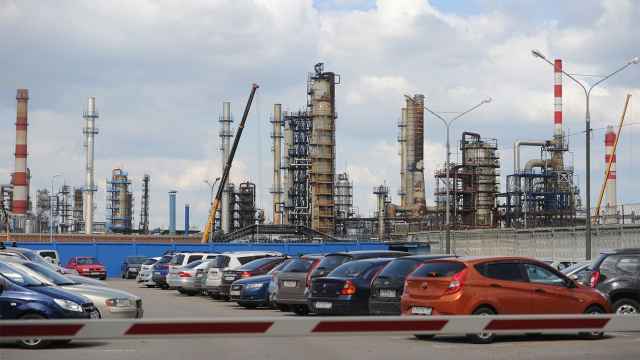Gasoline in Russia is being rationed from its western Baltic enclave of Kaliningrad to Vladivostok in the Far East.
The nation that parades as an energy superpower cannot keep its own drivers on the road. In some regions, motorists are limited to 10-20 liters per visit — if they can find gasoline at all. In others, only diesel remains.
Prices have soared as well. Wholesale gasoline has jumped over 50% since January, hitting record highs, while diesel costs have surged nearly 10% in just a month, making fuel increasingly unaffordable for ordinary Russians.
Pavel Bazhenov, head of the Independent Fuel Union, said the measures were simply to help station owners “weather the difficult period of shortages” and prevent more closures — a fate that has already hit smaller operators.
Last week the pro-Kremlin daily Izvestia reported that Lukoil, the country’s second-largest oil producer, had banned the sale of gasoline in jerry cans at some Moscow stations and stopped accepting fuel cards at stations in Nizhny Novgorod in a bid to curb panic buying.
This is not just wartime inconvenience. It’s a warning flare, exposing the deepening cracks in Russia’s war economy.
The cause? Relentless Ukrainian drone strikes on refineries, supply chains breaking apart and a Kremlin scrambling to pretend all is well. On some days, Russia’s refining capacity has collapsed by nearly a fifth, with exports from key ports sharply curtailed.
In fact, according to Kommersant, about half of Crimea’s gas stations have already run dry. The situation is dire in the Far East and the Volga Federal District too, where fuel supply chains stretch thin and shortages bite hardest.
Since August, Ukraine has escalated drone strikes on Russian refineries, knocking at least five plants partly or fully offline. The outages have cut Russia’s refining capacity by 17%, equal to about 1.1 million barrels a day, and pushed wholesale fuel prices sharply higher.
For a state that parades as an energy superpower, it is a humiliation measured in barrels and rubles.
Reports suggest that Moscow is now weighing cuts to oil production because of relentless drone attacks — a claim pipeline monopoly Transneft rushed to deny, underscoring just how sensitive the Kremlin has become to any hint of fragility in its energy sector.
Dmitry Peskov, the Kremlin’s spokesman, recently declared that Russian citizens are “completely united around President Putin” and ready to shoulder any burden. He insists the state remains “balanced, predictable, and stable.” What that actually means is the continuation of a status quo that only really works for people in the Kremlin.
Meanwhile, Russia is sinking deeper into recession. VEB, the state-owned development bank that bankrolls major government projects, now forecasts GDP contracting by 0.6% for two straight quarters — a textbook technical recession.
Even German Gref, the powerful head of cornerstone lender Sberbank, conceded this month that the economy has slipped into “technical stagnation.”
And the Finance Ministry, intent on making ordinary Russians shoulder the burden, is pushing to raise VAT from 20 to 22% to fund “defense and security.”
To be blunt: this is not a sacrifice. It is extortion of a country already under pressure.
Half of the Crimean peninsula without fuel? Regions starving for gas? That should be a national scandal. But in Putin’s Russia, it is just another existential cost of loyalty.
Putin’s loyal propagandists now claim the shortages are just “scheduled oil refinery maintenance,” while state media insist they are temporary “objective factors” like transport bottlenecks and bad weather — even as regional officials quietly admit rationing is very real.
As the fuel crisis deepens, Deputy Prime Minister Alexander Novak disclosed on Sept. 25 that the government will extend the ban on gasoline exports through the end of the year and impose a diesel export ban on non-producers.
Novak, who served as Putin’s energy minister for eight years, admitted that some regions were still facing shortages but insisted they were “covered by accumulated reserves,” while cautioning that “the overall balance for both September and October is a difficult one.”
Farmers fear their machinery will grind to a halt. Truckers whisper of ruin. Ordinary Russians, already battered by inflation and conscription, now face the degradation of their daily commute.
We have seen this movie before. In January 2022, Kazakhstan’s sudden fuel-price revolt exploded into a full-blown political uprising.
What began as anger over a spike in LPG (liquefied petroleum gas) prices, a fuel many Kazakhs rely on to run their cars, quickly spiraled into nationwide unrest with mass protests, looting, torched government buildings and finally a desperate plea for help that brought Russian troops to “restore order.”
Those protests did more than torch buildings — they torched a dynasty.
Nursultan Nazarbayev, who had ruled Kazakhstan for three decades since the Soviet collapse, was forced to step aside in the turmoil’s aftermath. His handpicked successor, Kassym-Jomart Tokayev, consolidated power in the chaos, sidelined the Nazarbayev clan, and promised reform while tightening his own grip.
Russia may laugh at Kazakhstan’s fate. It may well avoid it. It has weathered unrest from fuel shortages in Dagestan in 2023 and protests against utilities shortages still take place despite a crackdown on civil organising. But when a fuel crisis boils over, there is often no one left to answer the call.
Putin once used energy exports to project power. Now his own state struggles to fuel itself. He can ban exports, dole out propaganda about saboteurs, or send officials on bike patrols to gas stations.
But no spin can mask empty pumps. Putin may have spent decades jailing critics, hushing the press and even executing dissenters. But you cannot spin your way into a full gas pump. Not when complaints are spreading across Telegram of gas stations admitting to customers that there is no fuel.
It would be ironic if Putin’s empire, built on fossil fuel dominance, collapsed because he could not keep the lights on — or the pumps pumping.
Just as soaring fuel prices in Kazakhstan toppled Nazarbayev after three decades in power, a regime that cannot keep its people moving risks breaking under its own weight.
Complacent citizens hoping for stability may wake up one morning unable to drive, operate, or resist.
Certainly, Russia may yet patch its fuel system. Refineries could be repaired, supply chains rerouted and rationing eased if the Kremlin throws enough money and muscle at the problem.
But every fix comes at a mounting cost, draining reserves and exposing just how brittle the foundations of Putin’s so-called energy superpower have become. Fragility hides in plain sight until it suddenly explodes. Putin rose on oil and gas, but time will tell whether he falls at the pump.
A Message from The Moscow Times:
Dear readers,
We are facing unprecedented challenges. Russia's Prosecutor General's Office has designated The Moscow Times as an "undesirable" organization, criminalizing our work and putting our staff at risk of prosecution. This follows our earlier unjust labeling as a "foreign agent."
These actions are direct attempts to silence independent journalism in Russia. The authorities claim our work "discredits the decisions of the Russian leadership." We see things differently: we strive to provide accurate, unbiased reporting on Russia.
We, the journalists of The Moscow Times, refuse to be silenced. But to continue our work, we need your help.
Your support, no matter how small, makes a world of difference. If you can, please support us monthly starting from just $2. It's quick to set up, and every contribution makes a significant impact.
By supporting The Moscow Times, you're defending open, independent journalism in the face of repression. Thank you for standing with us.
Remind me later.



